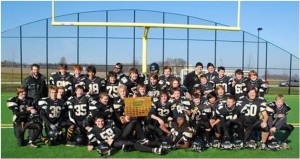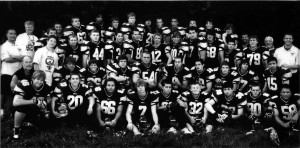Category Archives: Football
2008 GBSSA Senior Football Champions
HAWLEY “HUCK” WELCH
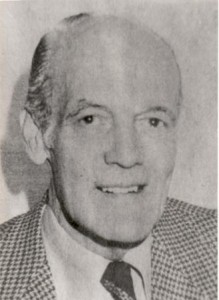 Fifty years ago the late Lou Stapleton made this remark when he watched a gangling,
Fifty years ago the late Lou Stapleton made this remark when he watched a gangling,
square-jawed fifteen year-old schoolboy trot out on a football field for the first time.
“That kid will be a great football player some day”. Lou couldn’t have made a
more exact prediction because that kid was Hawley “Huck” Welch, who, after a brilliant career with Hamilton and Montreal was inducted into Canada’s Football Hall of Fame in 1966.
He did everything the right way when he performed for the Collingwood Collegiate that season but what impressed Lou most of all was the ease in which Huck sent up those long, smooth sailing spiraling punts with his educated toe.
Huck left Collingwood in his sophomore year and moved off to Hamilton. It did not take Huck very long to get established in that hotbed of football. He helped Delta Collegiate win two successive Ontario Secondary Schools titles and the Tigers picked him up at the end of the 1927 season. He never looked back.
The Tigers won Grey Cups back to back in 1927 and 1928 and the deadly right foot and broken field running of Huck Welch played no small part in the success of that great Tiger team. They still talk about the kicking duels between Welch and Ab Box of the Argos.
One Saturday afternoon Welch kicked three singles and Box kicked two. Hamilton won 3-2. Ted Reeve wrote in his column. “Ab Box kicked the ball clean over Hamilton Mountain and Huck Welch kicked it back.”
He moved over to the Montreal Winged Wheelers in 1930 when Warren Stevens introduced the forward pass to Canadian football. He helped Montreal win the Grey Cup in 1931 and in 1933 crowned his great football career by winning the Jeff Russell Trophy as the most valuable player in Canadian Football.
He finished his career back in Hamilton in 1937.
Huck served with distinction as an officer in the Royal Hamilton Light Infantry in World War 11 and we had the pleasure of watching Huck and an all-star Canadian service football team beat the Americans in London=s White City Stadium in the spring of 1944. As a matter of fact we managed to pick up a bit of that 5 to 1 money the Yanks were tossing around.
SCOTT LECKY
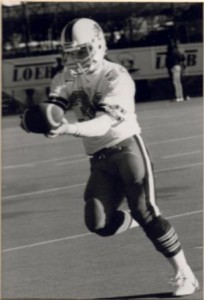 Scott was born in Staten Island, New York, U.S.A., December 9, 1964, and at the time of his 1992 election to the Hall he was living in Collingwood.
Scott was born in Staten Island, New York, U.S.A., December 9, 1964, and at the time of his 1992 election to the Hall he was living in Collingwood.
Following his schooling in Collingwood and Cameron Street Public School, Collingwood Collegiate Institute and at the University of Guelph, football
became his life.
A summary of his playing career is seen in the following:
– 1979-1982 -Played football, and other sports, at Collingwood Collegiate Institute
-1979-80 Scott was the junior boys’ athlete of the year at Collingwood Collegiate
Institute
-1980 He was the MVP on the CCI junior football team and played on the midget
basketball team.
– 1982-MVP senior football at CCI and winner of the Robertson-Titus Football
Award.
– 1982-83-Competed in track and field and as of his induction to the Hall of Fame
still held five records in that sport at Collingwood Collegiate Institute.
-Played football at the University of Guelph 1983-1985
– 1983 –was named the University of Guelph’s ‘Rookie of the Year’
-1984 – Played with the Ottawa Schooners Junior Football Club and won the Canadian Championships.
-Member of the Canadian Football League’s B.C. Lions 1986-1989
– 1986-Scott was named the B.C. Lions ‘Rookie of the Year’
-In 1986, in his starting game with the Lions, he played slotback and scored a
touchdown
-In 1988 he helped take the Lions to the Western Conference Finals and played as the starting slotback in the Grey Cup contest played in Ottawa.
Scott was inducted into the Sports Hall of Fame on Junes 20, 1992, in the Players’
category.
RYAN POTTER
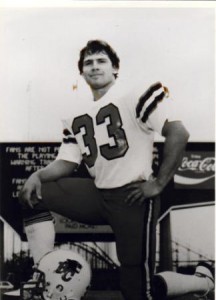 Back in 1974, running back Ryan Potter, donning CCI’s gold and black, dominated play in Simcoe County during his high school years, but had to ask for a tryout with the University of Western Ontario Mustangs.
Back in 1974, running back Ryan Potter, donning CCI’s gold and black, dominated play in Simcoe County during his high school years, but had to ask for a tryout with the University of Western Ontario Mustangs.
The first year I was at Western there were 45 running backs trying out for the team. “It was ludicrous” said Potter. “They ended up keeping six of us, and I was fortunate enough to be one of them.” Potter went on to have a five-year career in the Canadian Football League, and at the time was only the second Collingwood resident to ever get that far – the first being Jack Portland. But it was with the Mustangs that the tailback enjoyed his greatest success.
During his four-year playing career at Western, from 1978 -81, the Mustangs went 35-8 and won three consecutive Yates Cup Championships (emblematic of the Ontario university title). Potter was awarded the Dalt White Trophy as most outstanding player in two of those championship games – ’79 and ’81.
He had 1,172 yards on just 130 carries and ranks 10th on Western’s all-time yardage list, despite being the only player among those top 10 who had less than 200 carries.
Ryan started his career at Western with two fellow-freshmen running backs, Greg
Marshall and Mike Kirkley, who would form over the next four years perhaps the
most dynamic threesome in Canadian university football history, said Larry Haylor, long time head coach of the Mustangs. “We have always been motivated at Western by team goals and it’s testimony to Ryan’s character that he always placed team before self.”
In the 1982 CFL Canadian College Draft, Potter was chosen in the third round by
the B.C. Lions, who would later draft a couple of other Collingwood residents,
Scott Lecky and Reinhardt Keller. He played for four years with the Lions
and one more with Calgary before calling it quits.
At CCI, Potter was the captain for two junior teams, yet he played only one year
of senior because of his age. A two-way player, he won CCI’s athlete-of-the-year on two occasions.
Potter is married with two daughters and is a sales trainer for a pharmaceutical
company. He recently moved to Toronto from Vancouver. Ryan Potter was inducted into the Collingwood Sports Hall of Fame in 1994.
JACK PORTLAND
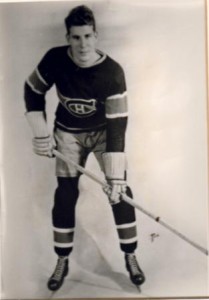 We can name a half dozen Collingwood boys who could be classed as “all round athletes” but from a national standpoint the honours must go to Big Jack.
We can name a half dozen Collingwood boys who could be classed as “all round athletes” but from a national standpoint the honours must go to Big Jack.
As a hockey player he starred for ten years in the N.H.L. with Montreal, Boston and Chicago.
His name will be found on the Stanley Cup, alongside such greats as Eddie Shore, Bill Cowley, Dit Clapper, Cooney Weiland and the Kraut line of Schmidt, Bauer and Dumart. That was the team of 1939, considered to be Boston’s greatest. That year the Bruins lost only ten games in a 48-game schedule and defeated Toronto four games to one in the Stanley Cup final.
His professional hockey career was cut short by at least five years when World War II intervened. After three years service with the Canadian Army, Jack never returned to the N.H.L.
Pro football lost him because hockey was his first love. He turned don three football offers before signing with Canadians. Jack represented Canada at the 1932 Olympiad at Los Angeles and the 1930 British Empire Games at Hamilton in the high jump event. We always thought he should have competed in the decathlon. He could run 100 yards in ten seconds, toss the javelin, heave the shot put, run the half mile, long jump and triple jump and, of course, set records in the high jump.
He finished his great athletic career back in his home town by playing for the Collingwood Shipbuilders and coaching the Collingwood Greenshirts to their first of four O.H.A. Junior “C” championships.
Jack Portland qualifies for the Collingwood Sports Hall of Fame in just about any category you care to mention.

